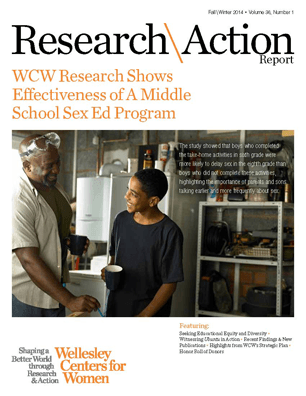Research & Action Report, Fall/Winter 2014
Improving the Quality of Youth Programs Nationwide: Expanding Access to the Assessment of Program Practices Tool (APT)
Project Director: Ellen Gannett, M.Ed.
Funded by: Virginia B. Toulmin Foundation
This funding will enable the National Institute on Out-of-School Time (NIOST) to: develop an online APT tutorial for programs initiating self-assessment and continuous program improvement; augment the interactive self-paced study tool the team is developing with support from the William T. Grant Foundation and the Massachusetts Department of Elementary and Secondary Education; and develop and disseminate materials nationwide to programs and stakeholders to build awareness of these new and renewed resources.
New York City Afterschool Matters Research Practitioner Fellowship
Project Director: Ellen Gannett, M.Ed.
Funded by: Pinkerton Foundation
This award provides funding for an Afterschool Matters Initiative Practitioner Fellowship group in New York City from fall 2014 to fall 2015. This group will expose 12-15 Fellows working with older youth to the world of inquiry research, and help them examine their own practices. Each Fellow will produce a paper or other product at the end of the process. The Fellows will be energized by their research and learning, becoming part of a strong network of professional out-of-school time workers in the New York Community.
Impact of National AfterSchool Association (NAA) Physical Activity Standards on Out-of-School Time Program Policies and Practice
Project Director: Georgia Hall, Ph.D.
Funded by: Robert Wood Johnson Foundation (with RTi to USD/RWJF)
This commissioned analysis builds upon earlier work conducted under ALR CA 70583 to Wellesley College. In that project, the Wellesley Centers for Women at Wellesley College and RTi created a pilot survey to assess uptake of the NAA Healthy Eating and Physical Activity (HEPA) standards. Results indicated reasonable saturation into the out-of-school time program community after two years of dissemination efforts. About 60 percent of respondents were familiar with HEPA standards, and of those, about 72 percent reported using them for program planning.
Food-Assistance Program Participation and Child Hunger in the United States
Project Director: Allison Tracy, Ph.D.
Funded by: Share Our Strength
Secondary analysis of the restricted-access National Household Food Acquisition and Purchase Survey (FoodAPS) / Food Environment Atlas dataset and supplemental data on county-level rates of participation in Child and Adult Care Food Program (CACFP) at-risk provision will empirically address the goals of Share Our Strength: to demonstrate that full participation in federal meal programs results in kids eating three meals a day, and to validate and calibrate program participation guideposts set by Share Our Strength as a proxy measure for kids eating three meals a day.


